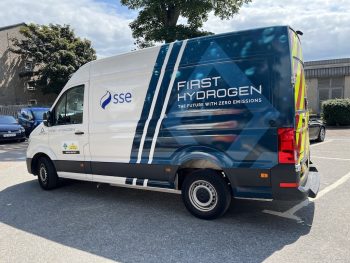SSE has reported strong vehicle performance and long driving ranges in its trials of First Hydrogen’s zero-emission van.

The energy firm tested the vehicle for a month on major roads in the Aberdeen area as part of a 120-vehicle fleet, achieving a vehicle range of some 400 miles from a single refuelling.
The van was operated from one of SSE’s sites in Aberdeen, located next to a hydrogen fuel station and enabling the utility company to evaluate the benefits of hydrogen mobility alongside its growing fleet of EV engineering and maintenance vehicles as an alternative to fossil fuels.
The vehicle was driven by four SSE employees, who had undergone two days’ training and used it to carry essential equipment and tools for their day-to-day jobs.
The data suggests that overall vehicle performance is better than expected, exceeding the results set in pre-trial commissioning tests, especially when driven at constant speed, when less braking and accelerating means less fuel is consumed.
As a hybrid, First Hydrogen’s vehicle can supplement fuel consumption with battery power when driving includes frequent shifts between acceleration and braking. During most of the journeys undertaken, the van maintained its battery at maximum charge by regenerating from braking i.e., the amount of kWh the battery charged and discharged was comparable, demonstrating the efficiency of First Hydrogen’s onboard energy management system.
The trials also put payload to the test. For several journeys, the hydrogen fuel cell electric vehicle (FCEV) drove fully loaded one way and was part loaded on the return. However, the drivers noted that heavier loads did not noticeably decrease vehicle speed, reduce vehicle range, or affect fuel cell performance.
Downtime and refuelling were also assessed. Due to refurbishment of Aberdeen’s hydrogen refuelling stations during the trial period, drivers had to refuel First Hydrogen’s van at 350 bar rather than the preferred 700 bar pressure fill. However, the vehicle continued to successfully carry out the longer routes SSE undertook, demonstrating its compatibility with existing infrastructure. The team noted that refuelling took a matter of minutes when recharging.
The driving experience – which has been engineered to be similar to a battery electric vehicle – also received consistently positive feedback from drivers. SSE employees commented that it was “quiet”, “smooth” and “pleasing to drive”. Drivers also found the range capability to be extremely impressive, and remarked that the First Hydrogen vehicle behaves more like a diesel vehicle in terms of range, but without the emissions.
SSE joined other fleet operators such as Rivus in trialling the First Hydrogen van and was the first utility to take part in the project, supporting its Net Zero Action Plan. In 2019, the company committed to transitioning over 3,000 fleet vehicles to electric by 2023, and it already has over 1,100 full EVs in its fleet.
Simon Gray, head of fleet services at SSE Plc, said: “SSE is focused on enabling, harnessing and deploying new technologies and innovations which can accelerate the journey to net zero. This trial period in Aberdeen has provided us with real-world insights into the performance of a hydrogen vehicle, a level of understanding that just isn’t possible from test data alone. By gaining first-hand knowledge of the van’s use in day-to-day scenarios, the feedback from this trial will be invaluable when considering if hydrogen fuel cell electric vehicles could fit into our fleets of the future.”
Steve Gill, CEO of First Hydrogen Automotive, added: “Working with such an enthusiastic team at SSE meant we were able to undertake different routes and see the vehicle perform in driving conditions it has not experienced before. We are thrilled with these initial results, which are helping us to build a true picture of the vehicle’s capabilities. The trial data shows efficient performance from the fuel cell and suggests that heavier payloads and consistent driving at higher speeds do little to diminish range.
“We have welcomed SSE’s enthusiasm for the trial and how receptive the team is to innovation, especially in the net zero space. The strength of this partnership means we are exploring opportunities to return to Scotland for a winter trial to test the vehicle’s performance in colder temperatures where hydrogen is expected to offer advantages over other zero emission technologies.”
The First Hydrogen trials have been co-ordinated through the Aggregated Hydrogen Freight Consortium (AHFC), which works with large UK fleet operators to accelerate the adoption of hydrogen transport through vehicle deployment and refuelling infrastructure development.

